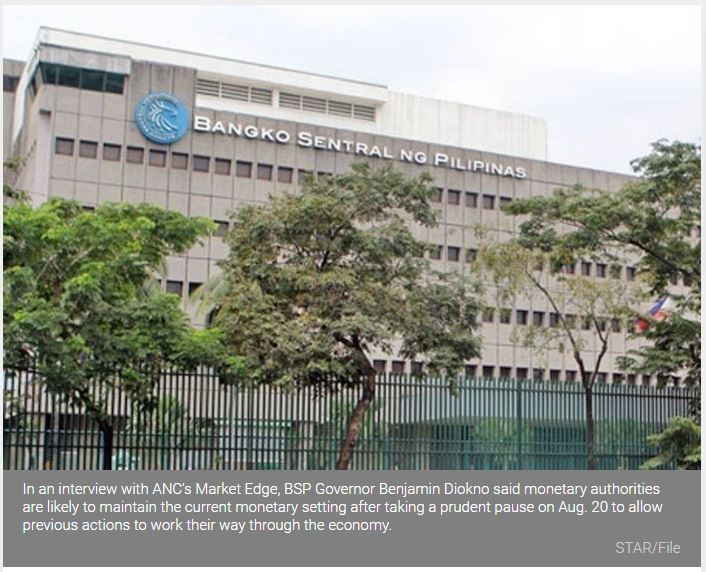Philippines: BSP to keep accommodative stance
MANILA, Philippines — The Bangko Sentral ng Pilipinas (BSP) may keep the country’s accommodative monetary policy stance over the next two years to help the economy fully recover from the impact of the COVID-19 pandemic.
In an interview with ANC’s Market Edge, BSP Governor Benjamin Diokno said monetary authorities are likely to maintain the current monetary setting after taking a prudent pause on Aug. 20 to allow previous actions to work their way through the economy.
“Right now, given that there is a lot of uncertainly still in the air, we are committed to a long-term low inflation regime, and to me that is what we intend to do. What we have down will be on the table for the next, maybe another two years,” Diokno said.
The BSP has been one of the most aggressive central banks in the world in addressing the impact of the COVID-19 pandemic through various measures that have unleashed P1.4 trillion into the financial system.
The COVID-19 measures include the cumulative 175 basis points cut in interest rates, bringing the overnight reverse repurchase rate to an all-time low of 2.25 basis points, as well as the lowering of the reserve requirement ratio for big banks by 200 basis points and for mid-sized and small banks by 100 basis points.
Other measures include the P300-billion repurchase agreement with the Bureau of the Treasury, the purchase of government securities in the secondary market, the temporary suspension of the term deposit facility auctions, and the lowering of the volume of the overnight reverse repurchase facility, among others.
Diokno said the mood of central banks around the world is to pursue a disengagement strategy.
“That’s the mood right now. We do not call it exit strategy, is a disengagement strategy. It should not be too early, nor too late because otherwise you would create moral hazard issues where some corporations or industries, which should have not been supported, will continue to rely on the support of the government,” the BSP chief said.
During the recently concluded 23rd ASEAN+3 finance ministers and central bank governors meeting, monetary and fiscal authorities agreed to take steps to reduce vulnerabilities to risks and to continue to use all available policy tools to support the sustained recovery of our economies.
“We will carefully measure the appropriate timing of the exit from these pandemic measures in accordance with the economic and pandemic situation of each member, to avoid a cliff effect and safeguard growth and financial stability in the ASEAN+3 region. We will remain resolute in our commitment to uphold an open and rules-based multilateral trade and investment system, and strengthen regional integration and cooperation,” finance ministers and central bank governors said in a joint statement.
The group agreed that the pandemic has taken a heavy toll on human lives globally and affected our economies paving the way for the implementation of necessary containment measures to control the transmission of the virus while this unavoidably impacted economic activity.
“With the global economy increasingly interconnected, the disruptions to global supply chains and the challenges faced by many industries as a result of the pandemic have demonstrated the importance of ensuring the resilience of our economies to shocks. We moved swiftly to mitigate the impact of the pandemic by deploying extraordinary measures in the forms of targeted fiscal, monetary and credit support to households and corporates, and accorded regulatory forbearance, as well as liquidity support, to the financial system,” they said.
Economic growth is projected to fall sharply for many economies this year, but is expected rebound going forward.
Source: https://www.philstar.com/business/2020/09/22/2044113/bsp-keep-accommodative-stance


 English
English




